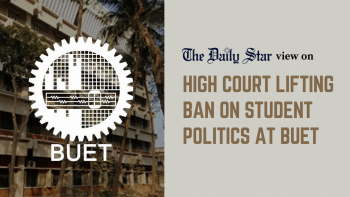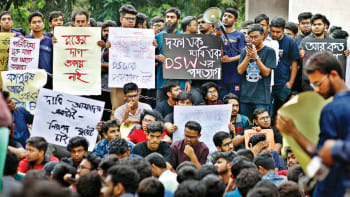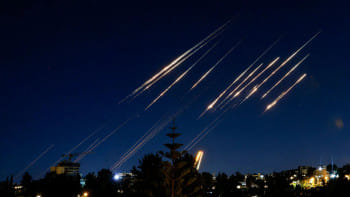Student politics, Buet and ‘Smart Bangladesh’

Bangladesh Chhatra League (BCL), AL's student wing, recently decided to restart its party politics in Buet, our premier university for engineering and technology. The High Court, in response to a writ petition, "stayed" the university's notice that banned student politics from its campus. Meanwhile, the general students of Buet have been vehemently opposing the reintroduction of student politics on their campus, the reasons for which are powerful, painful, and obvious.
They don't want any repeat of what is vividly etched in their minds—the fate of the second-year student of electrical and electronic engineering (EEE), Abrar Fahad, who, according to doctors, died from excessive pain and internal bleeding caused by several hours-long, incessant and brutal beatings with cricket stumps by BCL leaders.
This happened within hours of him visiting his mother in Kushtia. His only "crime" was a critical Facebook post.
It was not a one-off incident. It was the result of a culture built around the unquestioned and unmonitored power of the Chhatra League, which ran a parallel administration that dealt with the day-to-day lives of students, especially the junior ones. They decided which hall and which seats new students would occupy, how regularly they would have to attend party activities, how many times they would have to "show respect" to leaders, and in what "manner." Room 2011, a virtual torture cell, served to bring the not-so-obedient ones in line. We may have forgotten that when BNP was in power, its student wing, Chhatra Dal, did the same thing. Hence the revulsion of the general students at even the remotest prospect of such days returning.
Was it student politics that prevailed in Buet? Does it in any way reflect our glorious history of student politics that we feel so very proud of? Are the present-day student politicians the torchbearers of the past? Where is the vision, the ideology, and self-sacrifice? Today, what masquerades as student politics is power, wealth, and personal aggrandisement. Will our institutions of higher learning have any future if the present nature of student politics is not reformed?
Student politics of the late forties (after the birth of Pakistan) fifties, sixties, and the preparatory stage of the Liberation War (keeping the story of students' role in our Muktijuddho separate) were fully based on ideology, commitment, sacrifice, honesty, and public service. The role of students in our Language Movement was far more significant than that of any political party. The same is true for the anti-Ayub and anti-Yahya uprisings. Bangabandhu's Six Points programme was taken to the grassroots as much by Awami League as it was by Chhatra League. The Eleven Points programme of '69, mostly organised by leftist student bodies, of which Chhatra League was an integral part, stands out as one of the most significant transformative student and mass uprisings that encompassed a vision of social change far more comprehensive than that of any political party.
The history and tradition of our student movements of pre-liberation days are not only glorious and inspiring, but they constitute a stunning example of how the student community was able to lead the people on fundamental issues of democracy, economic, social, and cultural rights, and rights of the peasants and all disadvantaged communities. Student politics played the role of national political parties and forced politicians to adopt students' programmes as their own.
The truth is, none of that exists now.
Three years ago, we celebrated the 50th anniversary of our independence. Many things have changed, especially when it comes to the economy and infrastructure. Bridges, roads, elevated expressways, metros, ports, power plants, and other vital requirements have been built. The prime minister's latest call to transition from a "Digital Bangladesh" to a "Smart Bangladesh" can be our starting point for an examination of what sort of student politics we need at this moment.
A "Smart Bangladesh" needs smart students, smart students need smart teachers and smart teachers need smart universities to get the free, creative, and research environment to help guide the future generation of thinkers, researchers, writers, critiques, inventors, entrepreneurs and leaders who can bring to reality the opportunities that the 21st century will bring to our doorstep.
Can we visualise the current nature of student politics creating that necessary ambiance for that creativity to flourish among our students?
Student politics has now become an integral part of teachers' politics in most public educational institutions, especially universities. Instead of teachers guiding the students towards better politics, it is the students who, by their direct and indirect support, are determining how the election of a teacher's body will turn out.
The bigger picture of the politicisation of our whole education system has had its inevitable and vicious impact of "political" scholars replacing the real ones. Appointments, promotion, lucrative placements, scholarship, foreign trips, promotion of books written by "politically correct" scholars, etc. have led to an overall stifling of creativity leading to very few, if at all, of our highest seat of learning receiving the recognition that we need if we are to make any dent in the "knowledge world."
This brings us to the specific question of Buet, which is really our only showpiece institution in engineering and technology. It is our closest equivalent to India's Indian Institutes of Technology (IITs). We know what contribution the IITs have made to give India the global reach and prestige that it has.
All the renowned universities of the world have student politics that are very effective in protecting the rights and interests of the students. They operate through student representative bodies that are regularly and timely elected, and are compliant to their founding principles and by-laws. These student bodies have active and effective interaction with teachers, deans, and university administrations to uphold what is in the best interest of the students.
If we are to ever build globally respected educational institutions, we must rethink and reformulate, among other things, our teacher and student politics. The crux of the problem is that all of the above-referred student bodies serve the interest of the students, and ours serve the interest of their parent political parties. This is where the thought of modernising our student politics gets mired in the short-term interests of the political parties in power.
As we graduate to the status of a developing country, our need for qualified human resources will grow by leaps and bounds. Do we have knowledge centres that will produce the scholars that will guide us forward? We need to make Buet a far superior centre of learning than it is now. At the same time, we need dozens of new institutions of equal standing to supply the human resources that we will need.
The traditional type of student politics cannot lead us into the future. As student politics is reintroduced in Buet, can we think forward and introduce what prevails in quality educational institutes elsewhere?
As reported in the press, the short order of the High Court effectively reintroduces student politics in Buet. It is our ardent and sincere hope that the full verdict will contain strict directives as to what can and cannot be done in the name of student politics. While upholding students' right to indulge in politics, the High Court, through its full verdict, could admonish intimidation, verbal and physical abuse, and violence of any sort, and trigger an overdue reform in campus politics both for the students and the teachers.
The moment is now for a serious rethinking of this vital matter—our future.
Mahfuz Anam is editor and publisher of The Daily Star.
Views expressed in this article are the author's own.
Follow The Daily Star Opinion on Facebook for the latest opinions, commentaries and analyses by experts and professionals. To contribute your article or letter to The Daily Star Opinion, see our guidelines for submission.

 For all latest news, follow The Daily Star's Google News channel.
For all latest news, follow The Daily Star's Google News channel. 






Comments